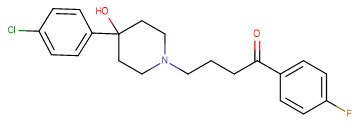
Haloperidol
CAS No. 52-86-8
Haloperidol ( McN-JR 1625 | NSC 170973 | NSC 615296 | R 1625 )
产品货号. M14873 CAS No. 52-86-8
Haloperidol 是有效的 dopamine D2 receptor 拮抗剂,为一种安定药。
纯度: >98% (HPLC)
 COA
COA
 Datasheet
Datasheet
 HNMR
HNMR
 HPLC
HPLC
 MSDS
MSDS
 Handing Instructions
Handing Instructions
| 规格 | 价格/人民币 | 库存 | 数量 |
| 25MG | ¥243 | 有现货 |


|
| 50MG | ¥324 | 有现货 |


|
| 100MG | ¥405 | 有现货 |


|
| 200MG | ¥527 | 有现货 |


|
| 500MG | 获取报价 | 有现货 |


|
| 1G | 获取报价 | 有现货 |


|
生物学信息
-
产品名称Haloperidol
-
注意事项本公司产品仅用于科研实验,不得用于人体或动物的临床与诊断
-
产品简述Haloperidol 是有效的 dopamine D2 receptor 拮抗剂,为一种安定药。
-
产品描述Haloperidol has been found to be highlt potent neuroleptic by relieving nervous through the depression of nerve function. Besides, Haloperidol has shown about 50-fold potency than chiorpromazine, the other antipsychotic drug. Haloperidol has shown beneficial effects in the treatment of delusions and hallucinations. These effects are mainly achieved through blockage of dopamine receptors in the mesocortex and limbic system. (In Vivo):Haloperidol (1 mg) intra-arterially attenuates the dopamine-induced pancreatic secretion. Haloperidol (3 mg) completely inhibits the action of 10 μg of dopamine in the pancreas of the dogs. Haloperidol (10 mg/kg) as well as chlorpromazine (CPZ, 15 mg/kg) blocks mescaline-induced altered behavior within 7 to 10 minutes when injected into the mice 45 minutes after 50 mg/kg (2 μc) of mescaline. Haloperidol has no effect on mescaline disappearance.
-
体外实验——
-
体内实验Haloperidol (1 mg) intra-arterially attenuates the dopamine-induced pancreatic secretion. Haloperidol (3 mg) completely inhibits the action of 10 μg of dopamine in the pancreas of the dogs. Haloperidol (10 mg/kg) as well as chlorpromazine (CPZ, 15 mg/kg) blocks mescaline-induced altered behavior within 7 to 10 minutes when injected into the mice 45 minutes after 50 mg/kg (2 μc) of mescaline. Haloperidol has no effect on mescaline disappearance.
-
同义词McN-JR 1625 | NSC 170973 | NSC 615296 | R 1625
-
通路Endocrinology/Hormones
-
靶点5-HT Receptor
-
受体5-HT| Dopamine
-
研究领域Neurological Disease
-
适应症——
化学信息
-
CAS Number52-86-8
-
分子量375.87
-
分子式C21H23ClFNO2
-
纯度>98% (HPLC)
-
溶解度Ethanol: 8 mg/mL (21.28 mM); DMSO: 75 mg/mL (199.54 mM)
-
SMILESC1CN(CCC1(C2=CC=C(C=C2)Cl)O)CCCC(=O)C3=CC=C(C=C3)F
-
化学全称4-[4-(4-chlorophenyl)-4-hydroxypiperidin-1-yl]-1-(4-fluorophenyl)butan-1-one
运输与储存
-
储存条件(-20℃)
-
运输条件With Ice Pack
-
稳定性≥ 2 years
参考文献
1.Cai G, et al. Mol Pharmacol. 1999 Nov;56(5):989-96.
产品手册




关联产品
-
Homoeriodictyol
Homoeriodictyol 是一种天然存在的、掩盖苦味的黄烷酮,是一种很有前景的增加食欲和食物摄入量的化合物。在分化的 Caco-2 细胞中,黄烷酮高圣油酚可以增加 SGLT-1 介导的葡萄糖摄取,但减少血清素释放。与其他多酚相比,黄烷酮高圣油酚在 100 μM 浓度下可促进葡萄糖摄取 29.0 ± 3.83%。
-
cis-Urocanic acid
cis-Urocanic Acid 是一种 5-HT2A 受体激动剂 (Kd: 4.6 nM)。它是一种免疫调节剂,通过与 5-HT2A 受体结合诱导免疫抑制。
-
Allopurinol Sodium
Allopurinol Sodium 是一种黄嘌呤氧化酶抑制剂,IC50 为 7.82±0.12 μM。



 021-51111890
021-51111890 购物车()
购物车()
 sales@molnova.cn
sales@molnova.cn







